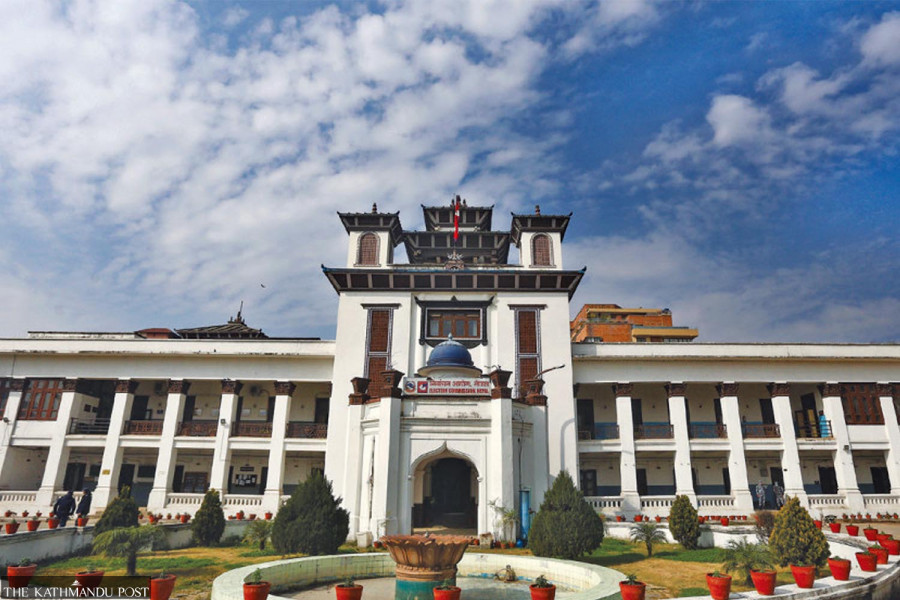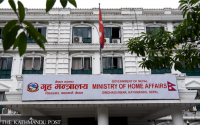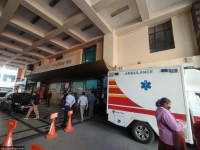National
Election Commission calls all-party meeting to discuss government decision to ‘scrap’ district poll offices
In the budget, the government announced to confine district election offices within the district administration office.
Tika R Pradhan
The Election Commission is holding an all-party meeting on Friday to discuss the government’s decision to ‘scrap’ district election offices.
Commissioner Ram Prasad Bhandari said the commission will hold consultations with all the parties as the government decided to keep the election offices under the executive going against the constitution.
The government, through its budget for the fiscal year 2023-24, announced it’d ‘scrap’ the district election offices and put the election-related works under the jurisdiction of district administration offices.
Bhandari said the commission will be forced to seek legal remedies to protect its autonomous authority and rights if the government doesn’t rectify the decision.
The government, however, says it decided to limit the District Election Offices to a small unit within the respective District Administration Offices in a bid to cut costs.
The government now plans to have only one employee as a focal person of the election body at the district administration office. All other positions of the district election office will be scrapped.
The Election Commission and experts have taken serious exception to the government move, accusing the authorities of trying to infringe on the rights of autonomous institutions.
Though government authorities claimed that having offices and many staffers in the 77 districts was not necessary as the next elections would happen only after four years.
“There will be a unit of the District Election Office at the District Administration Offices with an official to coordinate election-related works,” said Prakash Thapa, a press coordinator of Finance Minister Prakash Saran Mahat. “It doesn’t mean that the election offices were dissolved; they were shrunk to avoid unnecessary expenses.”
The Election Commission and election experts, however, say that the move was nothing but a ploy to infringe on free and fair elections that will ultimately affect the democratic system.
They have also claimed that the amount spent for those district offices was not a big deal for the country and questioned the intention of the leaders in power.
“In countries like Denmark and Sweden you don’t need any office or officials, just a representative of the home ministry conducts polls with the help of local representatives,” said Neil Kantha Uprety, a former chief election commissioner. “But in countries like ours, parties in government are involved in transferring the officials close to them so as to bring the voting results in their favour. Therefore, we developed structures of the election commission at the district levels.”
Uprety dared the government to close all the constitutional commissions including the Commission for Investigation of Abuse of Authority so that a lot of money would be saved.
It’s been more than three decades since the Election Commission set up its structures at the district level so that those offices could work throughout the year—collecting the names of new voters and launching awareness campaigns besides educating voters on the importance of the election.
The political parties were up in arms when the chief district officers were designated to lead the Election Code of Conduct Monitoring Committees and therefore the plan was changed—allowing the head of the District Treasury Controller’s Office to lead the monitoring committees.
According to officials at the Election Commission, 19 District Election Offices have their own buildings, in three other districts—buildings of District Election Offices are under construction while in eight districts such offices are stationed at other government buildings and as many as 12 other district election offices have purchased their own lands to construct their buildings. Only seven employees work at each district election office. Currently, the Election Commission has 70 district election offices and offices in all seven provinces.
Officials of the Election Commission led by Chief Election Commissioner Dinesh Thapaliya expressed concerns over this ‘unexpected’ government move to Deputy Prime Minister and Home Minister Narayan Kaji Shrestha on Monday.
According to an official present at the meeting, Home Minister Shrestha said he would consult with the prime minister and finance minister about it and would take a decision as per the consultation of the Election Commission.
“At a time when the government was expected to equip the Election Commission with more sophisticated equipment to ensure free and fair elections, this abrupt move has shocked us,” said one of the election commissioners.




 10.63°C Kathmandu
10.63°C Kathmandu














